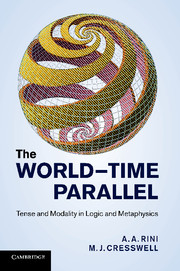Book contents
6 - The non-existent
from PART II - PREDICATE LOGIC: TENSE AND MODAL
Published online by Cambridge University Press: 05 March 2012
Summary
In interpreting the formulae of any predicate language we have to specify a domain D of individuals, and it is by no means a trivial question what D should contain. In the special case of modal and tense languages there is the question of whether D should contain things which do not presently exist but which did or will, or things which never actually existed but which might have. We shall try to show that there are at least prima facie reasons for permitting (as on p. 59) the quantifiers to range over the whole domain, and not just over the things which exist in the world in question at the time in question. At any rate we will give reasons for supposing that whatever you say on this question about times you should also say about worlds. We will begin by considering tense, and will try to isolate what we regard as some important semantical features of tensed language. We will then go on to show that modal sentences share these same features. Take the simple tensed sentence (17) on p. 6, relabelled here as (1):
(1) A child prodigy studied at this school.
From the point of view of English grammar the tense (at least at the surface level) attaches to the verb ‘studied’. Yet it is not hard to see that the semantics of (1) is more complex.
Information
- Type
- Chapter
- Information
- The World-Time ParallelTense and Modality in Logic and Metaphysics, pp. 62 - 74Publisher: Cambridge University PressPrint publication year: 2012
